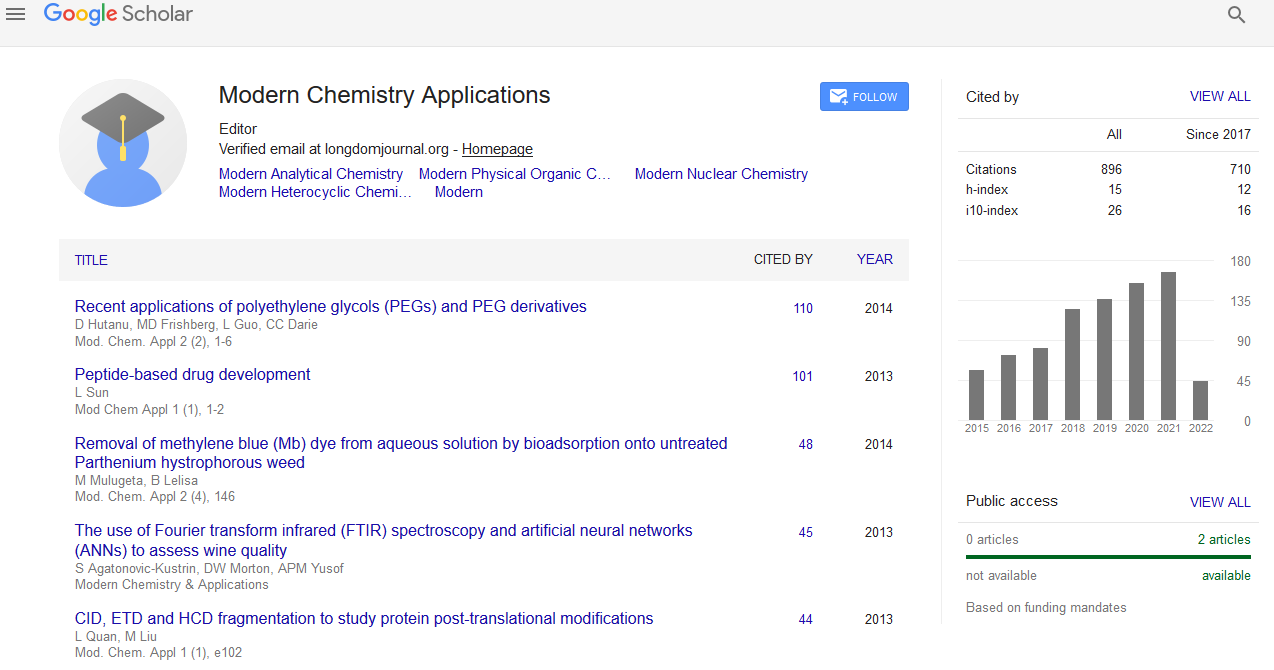Indexed In
- Open J Gate
- JournalTOCs
- RefSeek
- Hamdard University
- EBSCO A-Z
- OCLC- WorldCat
- Scholarsteer
- Publons
- Geneva Foundation for Medical Education and Research
- Google Scholar
Useful Links
Share This Page
Journal Flyer

Open Access Journals
- Agri and Aquaculture
- Biochemistry
- Bioinformatics & Systems Biology
- Business & Management
- Chemistry
- Clinical Sciences
- Engineering
- Food & Nutrition
- General Science
- Genetics & Molecular Biology
- Immunology & Microbiology
- Medical Sciences
- Neuroscience & Psychology
- Nursing & Health Care
- Pharmaceutical Sciences
Commentary - (2024) Volume 12, Issue 4
Enzyme Engineering: Revolutionizing Industrial Processes for a Sustainable Future
Sarah Williams*Received: 28-Nov-2024, Manuscript No. MCA-24-28406; Editor assigned: 02-Dec-2024, Pre QC No. MCA-24-28406 (PQ); Reviewed: 16-Dec-2024, QC No. MCA-24-28406; Revised: 23-Dec-2024, Manuscript No. MCA-24-28406 (R); Published: 30-Dec-2024, DOI: 10.35248/2157-7560.24.12.480
Description
The integration of chemical engineering and biotechnology is transforming industries by enabling the efficient use of enzymes in various applications. Enzymes, as natural biocatalysts, have been pivotal in many biological processes for billions of years. However, modern advances in biotechnology and chemical engineering have facilitated for more systematic and large-scale utilization of these proteins in industrial settings. By engineering enzymes, researchers are developing novel solutions to accelerate chemical reactions with greater precision, efficiency and sustainability, benefiting numerous sectors ranging from pharmaceuticals to food production and environmental protection. To modify enzymes for industrial applications, researchers use a combination of genetic engineering, protein engineering and computational modeling.
Genetic engineering allows the manipulation of the genetic code responsible for producing enzymes, enabling the introduction of mutations that alter their properties. Protein engineering goes a step further by modifying the enzyme’s structure directly, optimizing it for specific functions, such as increased stability at high temperatures or resistance to harsh chemicals. Computational models can predict how changes in the enzyme’s structure will affect its function, significantly speeding up the design process. The benefits of engineering enzymes are most evident in the field of biocatalysis, where enzymes are used to replace traditional chemical catalysts. Biocatalysis offers several advantages over conventional chemical processes, including milder reaction conditions, fewer side reactions and lower energy requirements. For example, in the production of pharmaceuticals, engineered enzymes can facilitate the synthesis of complex molecules that are difficult or impossible to produce using traditional chemical methods. By enabling more selective reactions, enzymes can improve yields and reduce the need for expensive reagents or solvents, making the process more cost effective and environmentally friendly.
Another potential area for engineered enzymes is in the production of biofuels. Enzymes play a critical role in converting biomass into fermentable sugars, which are then used to produce ethanol or other biofuels. However, the efficiency of these processes can be hindered by the complexity of the biomass. By engineering enzymes to break down plant cell walls more effectively or to tolerate harsher processing conditions, scientists can increase the efficiency of biofuel production, making it a more viable alternative to fossil fuels. Food processing is yet another sector where enzyme engineering has had a significant impact. Enzymes are already used in many food-related applications, such as the brewing of beer, the production of cheese and the preparation of baked goods.
Through enzyme engineering, these processes can be improved further. For example, engineered enzymes can be used to enhance the flavor, texture and nutritional content of food products. In baking, for example, enzymes can be employed to modify the dough’s structure, improving the texture of the final product and reducing the need for artificial additives. In dairy, engineered enzymes can help break down lactose, offering a solution for people with lactose intolerance. Another challenge is scaling up the production of engineered enzymes. While laboratory-scale production is relatively straightforward, manufacturing enzymes on an industrial scale presents logistical and cost challenges. To overcome this, bioprocess engineers are developing more efficient fermentation processes and optimizing the conditions for large-scale enzyme production. Advances in genetic engineering and synthetic biology are also helping to streamline the production of enzymes, making them more affordable and accessible for industrial use.
In the future, the integration of chemical engineering with biotechnology will continue to drive the development of more efficient and sustainable industrial processes. As researchers gain a deeper understanding of enzyme structure and function, they will be able to design enzymes that are better suited to the specific needs of different industries. This will not only improve the efficiency of existing processes but also open up new possibilities for creating innovative products and solutions. The continued evolution of enzyme engineering has the potential to play a transformative role in making industrial processes more sustainable, cost-effective and environmentally friendly, thus contributing to a more sustainable future.
Citation: Williams S (2024). Enzyme Engineering: Revolutionizing Industrial Processes for a Sustainable Future. Modern Chem Appl. 12:480.
Copyright: © 2024 Williams S. This is an open access article distributed under the terms of the Creative Commons Attribution License, which permits unrestricted use, distribution, and reproduction in any medium, provided the original author and source are credited.


